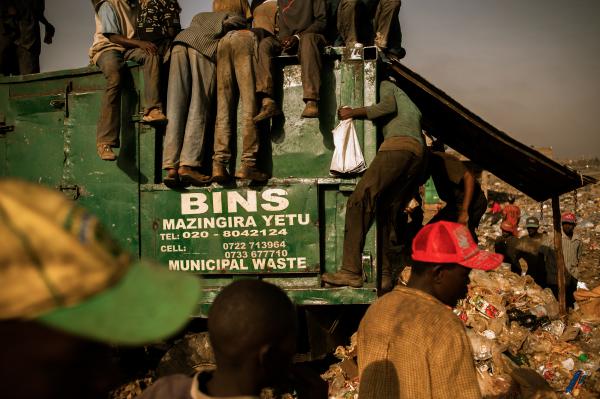
Weighted with heavy sacks of discarded milk bags and meat bones slung across her back, a plastic bag of rotting cabbage in her hand, Rahab Ruguru walks through a smoky landscape of putrefied burning trash.
"Working here is how I am able to feed my children," said the 42-year-old mother of six. "Dodging pigs, used condoms, eating what I find. No, it's not good for me. But it is a job, and I have to persevere."
Ruguru is one of an estimated 6,000 scavengers who arrive daily to mine the Dandora Municipal Dump Site, a sprawling, 30-acre garbage dump located nearly 10 miles north of Nairobi's thriving business district. Ruguru spends hours seeking food and sorting waste such as metals, rubber, glass, plastics, and electronics to sell to recyclers for no more than $2.50 a day.
Nearly 1 million people live in slums surrounding Dandora, the city's only trash site. While scavenging provides a living for Ruguru and others, some slum dwellers are campaigning to close it down. As a result, the dump's future has become the subject of a continuing political debate.
The scavengers are adamant about keeping the status quo.
"If they relocate this place, we will have nothing," said Julius Macharia, a 27-year-old trash picker. "They (city officials) do not care about us."
The opposing side is represented by a grassroots campaign called "Stop Dumping Death On Us." John Webootsa, a Roman Catholic priest and spokesman for the group, has appealed to Kenya's President Mwai Kibaki and Prime Minister Raila Odinga to relocate the dump.
"The air we breathe is acidic air, children are born with birth defects, the average life span is less than 50, the water we drink has turned tar black," Webootsa said.
A 2007 study by the U.N. Environmental Program found that children living near the site had high concentrations of lead and other heavy metals in their blood, and many residents suffered from skin disease and such respiratory ailments as asthma and bronchitis caused by burning trash.
International law requires dump sites to be decommissioned after 15 years, but Dandora has been in operation for nearly 40 years. While the Nairobi City Council declared the site "full" in 2001, an estimated 2,000 metric tons of waste is dumped daily, city officials say.
Local politicians blame rapid population growth - Nairobi has grown from 827,775 inhabitants in 1979 to 3.4 million today - a lack of leadership and an overwhelmed bureaucracy for the delay in closing the dump.
"Population growth has superseded our facilities," said Mutabari Inanga, a City Council member. Dandora has become "an environmental and health crisis for which we have had no one take responsibility."
Ruguru arrived in Dandora after post-election violence in 2007 forced her family to leave their farm near the western town of Eldoret. Except for her youngest child, a 4-year-old daughter, her entire family works the dump daily to pay for food, clothes and school books and uniforms.
On most days, Ruguru watches older children skip school to clamber up the sides of dump trucks arriving from the airport, seeking food tossed by passengers from incoming flights. Younger children sort through trash thrown on the ground by the bigger kids.
Once inside Dandora, an occasional fist fight breaks out among male scavengers over such coveted items as a half-eaten brownie. Ruguru and other women typically avoid such arguments, picking quietly through articles rejected by the children and men.
At the same time, some community activists hope Dandora's relocation will become a political issue in the 2013 elections, along with the privatization of waste management. Japan International Cooperation Agency - one of the world's largest development agencies - is studying the cost of closing Dandora in favor of an area near Jomo Kenyatta International Airport even though airport officials have expressed fear the site will attract birds and interfere with air traffic.
"Without a solid-waste-management plan ... we will be dealing with these problems for a long time," said Aggrey Otieno, a human rights activist who grew up next to Dandora.
For Ruguru, however, the dump's relocation will make little difference in improving her life.
"If this site moves, then I will move with it," she said.




